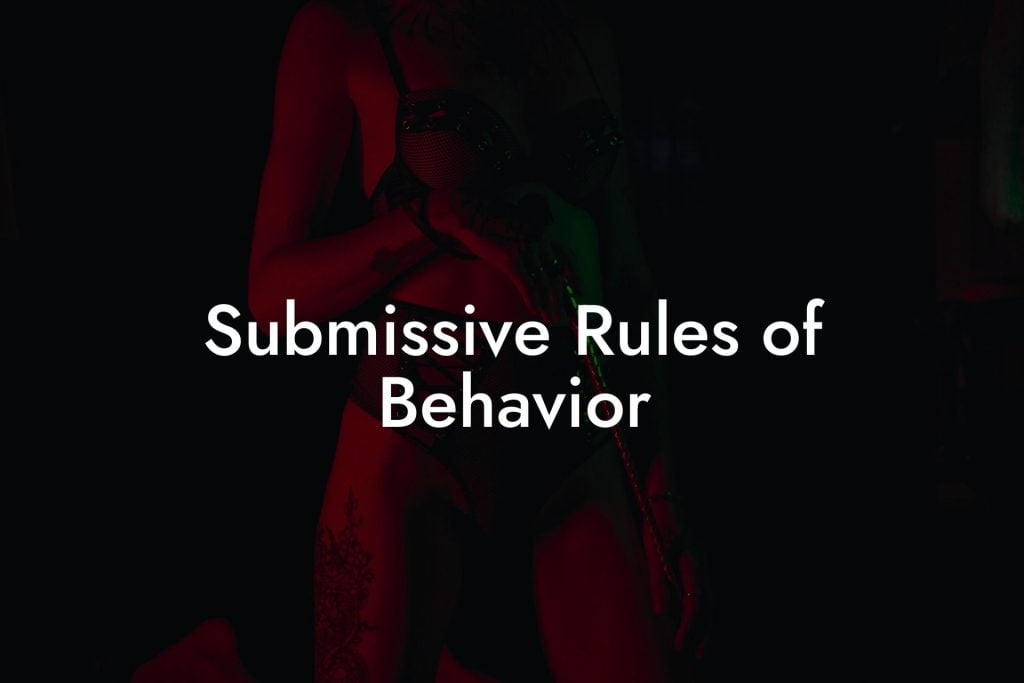In the enticing world of BDSM, male submissives play a vital role, embracing and exploring their desires for submission. Whether you're a seasoned sub or just curious about diving into this realm of power exchange, understanding the fundamental rules for male submissives is crucial. This detailed guide will delve into important aspects of being a male submissive, from communication to tasks and punishments. So, let's embark on a thrilling journey of submission together.
In any BDSM relationship, consent is the cornerstone of trust and respect. It’s more than just saying “yes” or “no”—it’s about openly communicating your desires, limits, and expectations. But trust doesn’t end with a conversation—it’s built through ongoing, clear agreements. That’s where our Dominant & Submissive BDSM Contract Pack comes in. Find out more →
Communication
To establish a healthy and fulfilling D/s dynamic, clear and open communication is paramount. Discuss your desires, boundaries, and limits with your Dominant partner. Establishing a safeword or signal is vital for maintaining trust and ensuring both parties feel safe throughout the scenes.
Tasks and Assignments
One of the core aspects of being a male submissive is carrying out tasks and assignments given by your Dominant. These tasks can vary from simple household chores to more complex and intimate acts of service. Embrace your duties with dedication and enthusiasm, knowing that fulfilling them brings you closer to your Dom's desired dynamic.
Punishments
Punishments maintain structure and discipline within a D/s relationship, allowing the submissive to learn from their mistakes and grow. While punishments should never cause harm or cross any hard limits, they should be effective tools for correction and growth. This section will explore various punishment techniques and how they can enhance the submissive experience.
Frequently Asked Questions
What is a BDSM Contract?
A BDSM Contract is a document, often quite detailed, that outlines the expectations, limits, and responsibilities of the parties involved in a BDSM relationship or scene. It works as a communicative tool to ensure that all parties understand and consent to the terms of the power exchange dynamic.
Looking for the best BDSM & Kink OnlyFans content creators? Here is a list of of our favourites that you will love:
-
- Best BDSM & Fetish OnlyFans - Molly✨ >> Link
- Best BBW & Huge Ass OnlyFans - Naughty Hanna Zimmer 💜🎀 >> Link
- Best Sexy Gaming Nerd OnlyFans - 🎮 Gracy EstuSWEET 🎮 >> Link
- Best Fetish & Kink Messaging OnlyFans - 💫Lola La Fleur 💫 >> Link
- Best Girl Next Door OnlyFans - ☀️Lily ⛅ >> Link
- Best Tiny European OnlyFans - 💝 Ami Allison 💝 >> Link
- Best Cosplay OnlyFans - 🐱 Little Kitty Kate 👉👌 >> Link
- Best Little OnlyFans - 🧸 Katya 🙇♀️ Sun >> Link
- Best Sub OnlyFans - 🍌Hanna Banana🍌 >> Link
- Best Teen & Huge Tits OnlyFans - ❣️Anny❣️19 y.o. BUSTY student girl >> Link
- Best Tiny Tits OnlyFans - ⍣⭐️ Sofia Parker ⭐️⍣ >> Link
- Best Sub & Huge Boobs OnlyFans - Nika Huge Boobs >> Link
- Best Kink OnlyFans - Sofia💖 >> Link
- Best Fetish & Girl Next Door OnlyFans - Hillary is Wet 💦 >> Link
- Best Dirty Latina OnlyFans - Paula Flores 😈 >> Link
Not quite what you are looking for? View the full list →
Are BDSM Contracts legally binding?
No, BDSM Contracts are not typically recognized as legally binding agreements in a court of law. They are more symbolic and serve as extensive tools for communication and negotiation between the parties involved.
How important is consent in a BDSM relationship?
Consent is the cornerstone of all BDSM activities. It is what differentiates BDSM from abuse. All activities should be consensual, negotiated, and agreed upon by every participant before they take place. Ongoing consent throughout the scene is equally important.
Can consent be withdrawn in a BDSM scene?
Yes, absolutely. Consent can and should be able to be withdrawn at any time during a BDSM scene. This is often facilitated by the use of safe words or gestures that have been agreed upon beforehand.
What are safe words, and why are they important?
Safe words are codes or phrases used to communicate during a BDSM scene, especially when normal verbal communication might be impeded. They provide a clear way to indicate limits, adjust intensity, or stop the activity altogether. They are essential for safety and consent.
What's the difference between a Dom/Dominant and a Sub/Submissive?
A Dom or Dominant assumes the role of the power holder and decision-maker in the dynamics of a BDSM interaction, while the Sub or Submissive agrees to surrender control to the Dominant within agreed boundaries and limits.
What are hard limits and soft limits?
Hard limits are activities or scenarios that an individual is not willing to engage in under any circumstances. Soft limits are activities that one may be hesitant about or only willing to try under specific conditions or scenarios.
How do people usually negotiate a BDSM scene or relationship?
Negotiation in BDSM typically involves open and honest communication about desires, fantasies, limits, health conditions, and safety concerns. This can happen verbally, through written communication, or by filling out BDSM checklists or contracts.
Is it normal to have feelings of guilt or shame after participating in BDSM?
It's not uncommon for individuals to experience feelings of guilt or shame following BDSM activities, often referred to as "sub drop" or "Dom drop." These feelings can be mitigated by providing aftercare and discussing the feelings openly with partners.
What is aftercare in BDSM?
Aftercare refers to the time and activities immediately following a BDSM scene, which involves taking care of one another emotionally and physically. This might include cuddling, blanket wrapping, gentle talking, or other forms of comfort.
How can we ensure safety during a BDSM scene?
Safety during a BDSM scene can be ensured by pre-scene negotiations, setting clear and respected limits, using safe words, getting consent for all activities, and having knowledge of the correct use of tools and techniques, as well as the awareness of potential risks.
Can someone be a dominant and a submissive?
Yes, someone can identify as a "switch," meaning they enjoy and are willing to take on both dominant and submissive roles, either in different scenes or with different partners.
Is training required to engage in BDSM activities?
While not legally required, training and education on safety, techniques, and psychology can be very beneficial for engaging in BDSM activities responsibly and safely. Workshops, classes, and guidance from experienced community members can be resources.
Are there any health concerns unique to BDSM?
Depending on the activities involved, health concerns in BDSM might include physical injury, nerve damage from binding or restraints, or psychological effects. It is important to be informed and take precautions to avoid such risks.
What role does trust play in a BDSM dynamic?
Trust is paramount in a BDSM relationship or scene. The intense nature of the activities requires a deep level of trust between the participants to ensure that limits will be respected and that the submissive will be safeguarded.
How do you build trust in a BDSM relationship?
Building trust in a BDSM relationship involves honest communication, respecting boundaries, mutually fulfilling agreements, consistent aftercare, and often, developing the connection over time through positive, consensual experiences.
Can BDSM elements be incorporated into an otherwise "vanilla" relationship?
Absolutely. Many couples choose to incorporate elements of BDSM into their sexual activities to explore power dynamics and enhance intimacy. It's important to communicate and negotiate these elements just as one would in a more-defined BDSM context.
What if my partner and I have mismatched desires in BDSM?
Mismatched desires in BDSM require communication and compromise. It's vital to discuss each person's interests and boundaries to find common ground or alternate ways to fulfill these desires while respecting each other's limits.
How common is it for people to live a 24/7 BDSM lifestyle?
Living a 24/7 BDSM lifestyle is less common than engaging in BDSM occasionally or in specific scenes. It requires a substantial level of commitment and lifestyle design that isn't suitable or desirable for everyone. However, for some, it's a deep expression of their relationship and dynamic.
Where can someone interested in BDSM learn more and find a community?
Those interested in BDSM can learn more from books, online resources, forums, and community events like play parties, workshops, and meetups. Websites like FetLife offer a platform to connect with like-minded individuals and find local events.
Should I be worried about privacy when engaging in BDSM?
Privacy is a valid concern for many BDSM practitioners, due to its often private and stigmatized nature. Use discretion when sharing personal information, understand the privacy policies of any platforms you're using, and consider the potential implications of public participation.
Now that you've gained a deeper understanding of the essential rules for male submissives, it's time to embrace your desires and embark on a fulfilling journey of submission. Share this article with others who might find it helpful, and don't forget to explore our fetish shop to fuel your kinky adventures. If you're ready to take your commitment to the next level, consider ordering our Ultimate BDSM Contract Pack, and check out our other guides available on Filthy Adult. Happy exploring!













